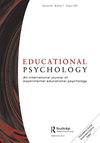Developing children’s humanity: the unique and interactive role of parents’ and peers’ humanity
IF 3
2区 心理学
Q1 EDUCATION & EDUCATIONAL RESEARCH
引用次数: 0
Abstract
AbstractThe present study investigated the unique and interactive role of parents’ and peers’ humanity virtue (i.e. kindness, love, and social intelligence) in association with children’s humanity. The participants were 761 fourth- to ninth-graders (Mage = 12.62; 45.2% boys) and their biological parents. The humanity subscale of the Values in Action Inventory of Strengths for Adults (VIA-IS) and Youth (VIA-Youth) was used to measure the humanity of each party. The results showed that mothers’ and fathers’ kindness were associated with children’s kindness, mothers’ love and fathers’ social intelligence were associated with children’s love and social intelligence, respectively. All three dimensions of the humanity of peers were positively related to that of children. Two-way interactions were found between mother and peer systems and displayed distinct interaction patterns in terms of kindness and love. Possible explanations and directions for future research are discussed.Keywords: Humanityvirtueunique roleinteractive roleparentpeer Authors’ contributionsLisha Liu carried out the design of the study, performed the statistical analysis, and drafted and revised the manuscript. Qian Wang drafted and revised the manuscript. Yanfang Li supervised the project and were in charge of overall direct and planning. All authors read and approved the final manuscript.Disclosure statementNo potential conflict of interest was reported by the author(s).Additional informationFundingThis work was supported National Natural Science Foundation of China; the Fundamental Research Funds for the Central Universities发展儿童人性:父母与同伴人性的独特互动作用
摘要本研究探讨了父母和同伴的人性美德(善良、爱和社会智力)在儿童人性发展中的独特互动作用。参与者为761名四年级至九年级学生(Mage = 12.62;45.2%男孩)及其亲生父母。采用《行动价值优势量表》(VIA-IS)和《青少年优势量表》(VIA-Youth)中的人性分量表来衡量双方的人性。结果表明,母亲和父亲的善良与儿童的善良相关,母亲的爱和父亲的社会智力分别与儿童的爱和社会智力相关。同伴人性的三个维度都与儿童人性呈正相关。母亲和同伴系统之间存在双向互动,在善良和爱方面表现出不同的互动模式。讨论了可能的解释和未来的研究方向。关键词:人性、美德、独特角色、互动角色、父母、同伴作者的贡献刘丽莎负责本研究的设计,进行统计分析,并起草和修改稿件。王谦起草并修改了原稿。李艳芳监督项目,负责整体指导和规划。所有作者都阅读并批准了最终的手稿。披露声明作者未报告潜在的利益冲突。项目资助:国家自然科学基金;中央高校基本科研业务费
本文章由计算机程序翻译,如有差异,请以英文原文为准。
求助全文
约1分钟内获得全文
求助全文
来源期刊

Educational Psychology
Multiple-
CiteScore
6.40
自引率
6.20%
发文量
57
期刊介绍:
This journal provides an international forum for the discussion and rapid dissemination of research findings in psychology relevant to education. The journal places particular emphasis on the publishing of papers reporting applied research based on experimental and behavioural studies. Reviews of relevant areas of literature also appear from time to time. The aim of the journal is to be a primary source for articles dealing with the psychological aspects of education ranging from pre-school to tertiary provision and the education of children with special needs. The prompt publication of high-quality articles is the journal"s first priority. All contributions are submitted "blind" to at least two independent referees before acceptance for publication.
 求助内容:
求助内容: 应助结果提醒方式:
应助结果提醒方式:


